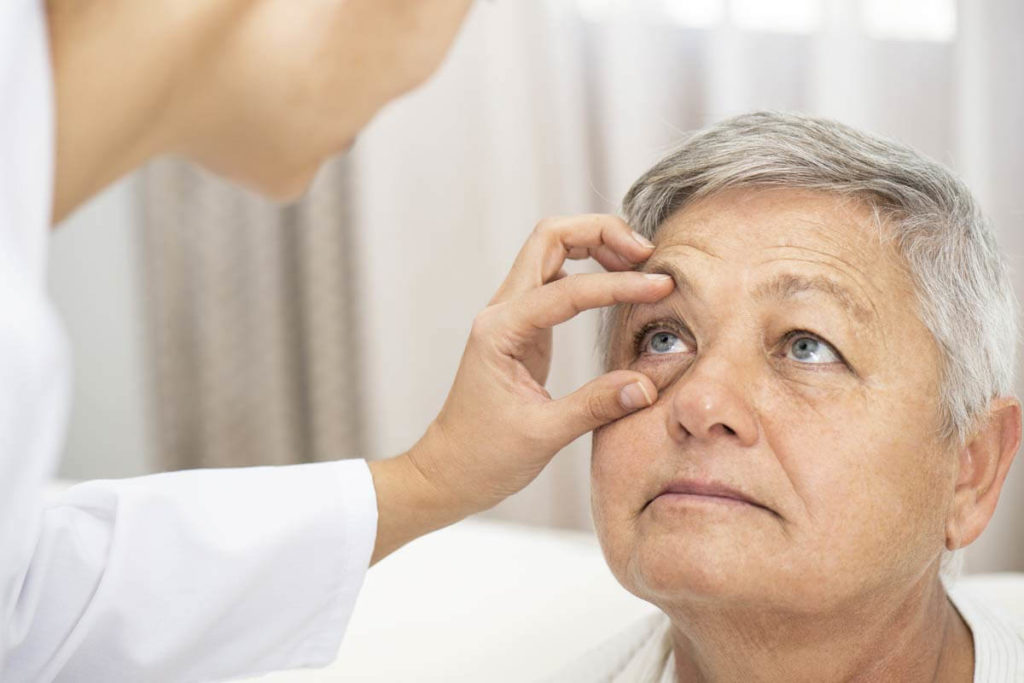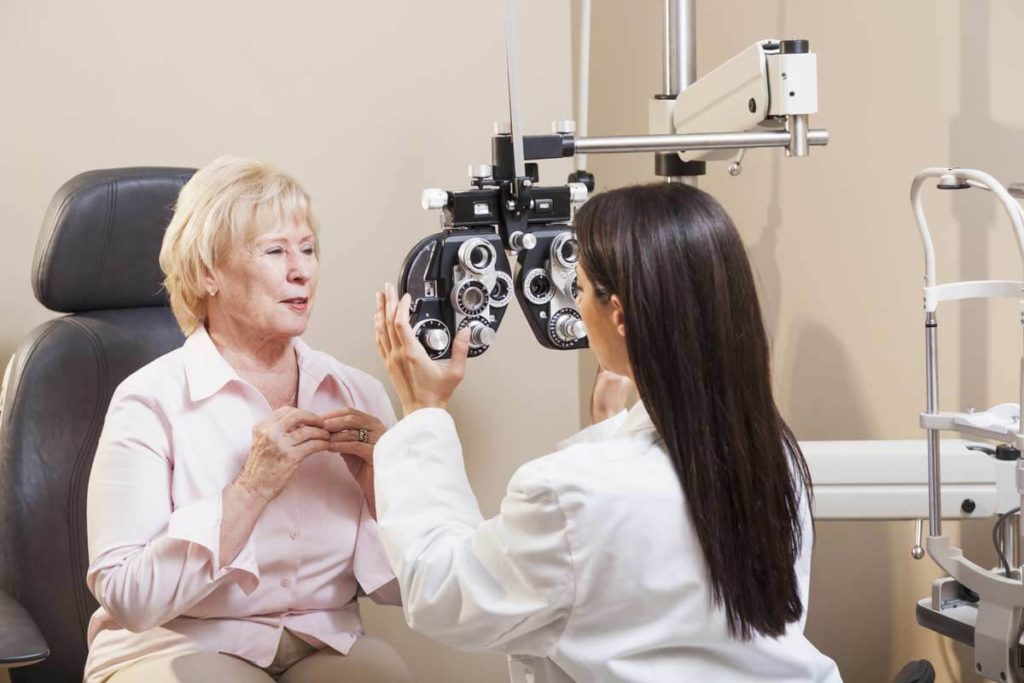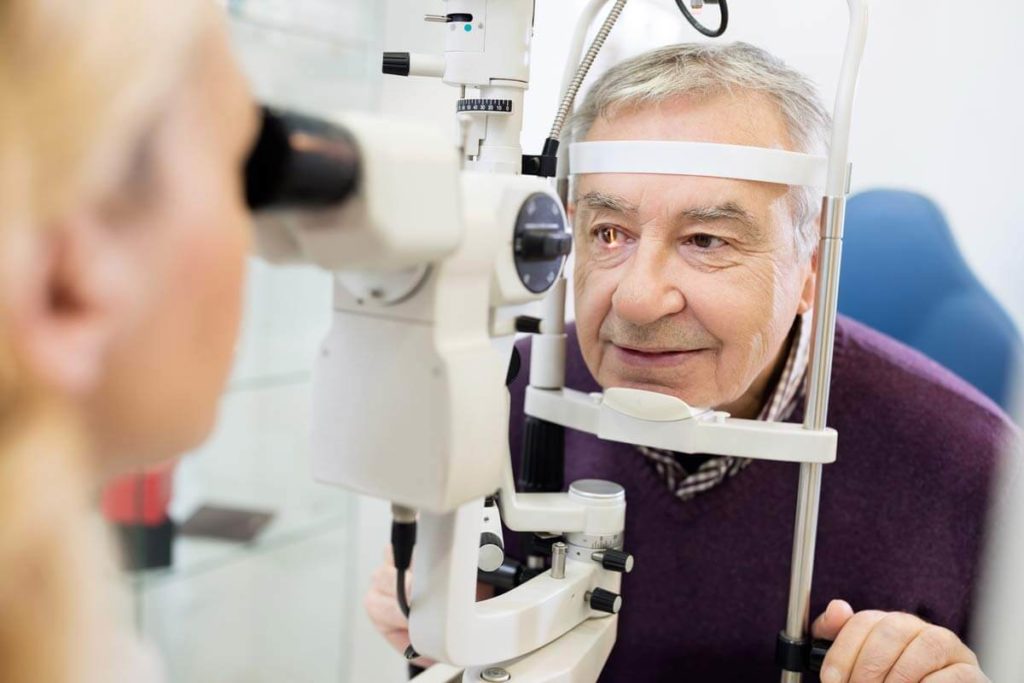The Elderly and Common Vision Issues
Regular eye exams can help identify any changes in vision while potentially treatable, according to the AOA. A few of the issues most problematic to the elderly include:
Age-Related Macular Degeneration
An eye disease that causes vision loss in the center of the eye (not the sides), making it harder to engage in forward-looking activities that require a bit of focus, such as reading, driving a vehicle, or watching your favorite television show.
Cataracts
Characterized by cloudy eye lenses causing blurry vision, cataracts can dull colors and increase glare sensitivity.
Dry Eye
Afflicting a large number of the elderly, dry eyes occur when tears are too few or are poorer in quality, ultimately reducing vision clarity.
Glaucoma
This term covers a variety of eye diseases that damage the optic nerve and cause a loss in vision, eventually reducing peripheral (side) vision too if left untreated.
Retinal Detachment
Detachment occurs when the retina is torn from the underlying tissue due to trauma, inflammatory eye conditions, or other health issues. This causes permanent vision loss if it’s not treated quickly.
What benefits does Medicare offer toward these types of issues to help participants get and keep the best vision possible as they continue to age?
Original Medicare Coverage and Vision Testing

Original Medicare in general does not cover regular eye exams necessary for getting new or updated eyeglasses or contact lenses, according to Medicare.gov.
In all of these situations—the diabetic exams, glaucoma tests, and macular degeneration tests—the costs passed on to the participants is the same.
So, if you were to make an appointment strictly because you currently wear glasses or contacts and you notice that your vision is getting worse—likely signifying that you need a new prescription—the exam would not be paid for by Medicare.
However, Medicare Part B will pick up some vision testing expenses in certain circumstances.
Diabetic Exams
The first is if you have diabetes. In this case, Part B will cover one eye exam per year to look for diabetic retinopathy and it must be conducted by a doctor who is licensed to perform this particular test.
Diabetic retinopathy occurs when small blood vessels that typically provide nutrients to the retina become damaged, causing a leak in blood and fluids. This leaking results in swelling in the surrounding tissues, clouding the person’s vision.
The AOA says that the risk of having this condition tends to increase the longer the person has had diabetes, which is why it’s important for those seniors who may have had diabetes for years already.
Glaucoma Tests
Medicare Part B will also pay for a glaucoma test once a year if you are categorized as being at high risk of developing this condition.
This includes individuals who:
- Have diabetes
- Have glaucoma in their family history
- Are 50 years old or older and are African American
- Are 65 years old or older and are Hispanic
Additionally, to be covered by Medicare, this test must be conducted by a doctor who can legally perform the exam or supervise its performance.
Macular Degeneration Testing (And Treatment)
If you have age-related macular degeneration, you have some vision benefits under Medicare Part B.
Medicare.gov says that coverage includes tests used to diagnose this condition, as well as some of the treatments designed to make it better, such as injectable drugs.

Original Medicare Costs Associated with Vision-Related Testing
In all of these situations—the diabetic exams, glaucoma tests, and macular degeneration tests—the costs passed on to the participants is the same.
Medicare Part B recipients can expect to pay 20 percent of the Medicare-approved amount for that particular exam or test.
Any deductible you may have under Part B applies as well.
If the exam is conducted in a hospital outpatient setting, which means that it is needed as a result of an emergency service or prior to surgery, you may have to pay a copayment. The amount of this copayment is dictated by your individual plan.
Original Medicare and Cataract Surgery
In addition to covering some of the expenses associated with treating age-related macular degeneration, Medicare covers a specific set of costs related to cataract surgery conducted via traditional surgery or lasers because this is deemed a “medically necessary” procedure.
With a Medicare Advantage plan, you are entitled to all of the benefits covered under Original Medicare (the federal health insurance program), but they are provided by private insurance companies instead.
Medicare Part B also assists by helping pay for corrective lenses required after cataract surgery in which an intraocular lens is implanted. These corrective lenses—whether eyeglasses or contacts—must be purchased from a Medicare-enrolled supplier in order to be covered either in whole or in part.
To determine what your portion of the expenses would be if you have Medicare Part B and need cataract surgery, Medicare.gov recommends checking with the doctor or medical care facility conducting the procedure. They’ll be able to give you a better estimate based on:
- How much care you’ll need post-surgery
- Whether the surgery will be conducted on an inpatient or outpatient basis
- Whether you’ve met your deductible
- If you have any copayments
- If you have any other additional insurance policy that may pick up some or all of the costs

Medicare Advantage and Vision Coverage
If you want a Medicare-based plan that offers vision coverage, Medicare Advantage is one option to consider.
With a Medicare Advantage plan, you are entitled to all of the benefits covered under Original Medicare (the federal health insurance program), but they are provided by private insurance companies instead.
This allows you to choose a policy that offers vision coverage in addition to the typical Medicare coverages. You may pay a bit more for it, but it may be cheaper than paying your own expenses toward exams, eyeglasses, and contacts on an annual basis.
Do not confuse Medicare Advantage with Medigap insurance. Medigap doesn’t typically offer vision care or eyeglass benefits, but it can be used to help cover costs associated with copayments, coinsurance, and deductibles.
Medicare vision coverage is limited, but it does provide benefits in some cases. It’s important to always check with your individual plan to know for sure what your policy will pay and what amount you’ll be responsible for.
Do you want to cite this page? Use our ready-made cite template.
